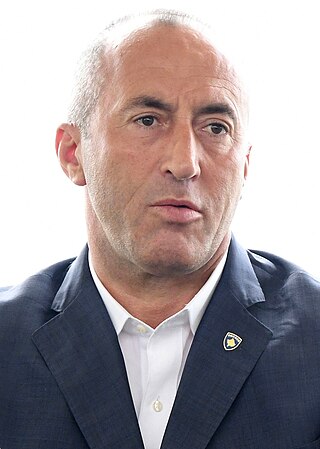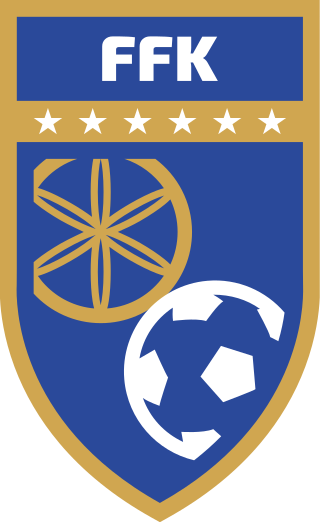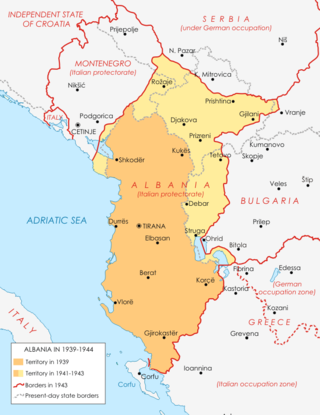
The Kosovo War was an armed conflict in Kosovo that lasted from 28 February 1998 until 11 June 1999. It was fought between the forces of the Federal Republic of Yugoslavia, which controlled Kosovo before the war, and the Kosovo Albanian separatist militia known as the Kosovo Liberation Army (KLA). The conflict ended when the North Atlantic Treaty Organization (NATO) intervened by beginning air strikes in March 1999 which resulted in Yugoslav forces withdrawing from Kosovo.

Kosovo, officially the Republic of Kosovo, is a country in Southeast Europe with partial diplomatic recognition. Kosovo lies landlocked in the centre of the Balkans, bordered by Serbia to the north and east, North Macedonia to the southeast, Albania to the southwest, and Montenegro to the west. Most of central Kosovo sits on the plains of Metohija and the Kosovo field. The Accursed Mountains and Šar Mountains rise in the southwest and southeast, respectively. Kosovo's capital and largest city is Pristina.

The Kosovo Liberation Army was an ethnic Albanian separatist militia that sought the separation of Kosovo, the vast majority of which is inhabited by Albanians, from the Federal Republic of Yugoslavia (FRY) and Serbia during the 1990s. Albanian nationalism was a central tenet of the KLA and many in its ranks supported the creation of a Greater Albania, which would encompass all Albanians in the Balkans, stressing Albanian culture, ethnicity and nation.
This is a list of historical and living Albanians who are famous or notable, sorted by occupation and alphabetically.

Ramush Haradinaj is a Kosovo Albanian politician, leader of the AAK party, and the third prime minister of Kosovo. He is a former officer and leader of the Kosovo Liberation Army (KLA), and previously served as Prime Minister of Kosovo between 2004 and 2005.

Kuršumlija is a town and municipality located in the Toplica District of the southern Serbia. It is situated near the rivers Toplica, Kosanica and Banjska, southeast of Mount Kopaonik and northwest of Mount Radan. As of 2022 census, the municipality has a population of 15,905 inhabitants.

Eternity and a Day is a 1998 Greek drama film directed by Theo Angelopoulos, and starring Bruno Ganz, Isabelle Renauld and Fabrizio Bentivoglio.

Bad Company is a 1972 American Western film directed by Robert Benton, who also co-wrote the film with David Newman. It stars Barry Brown and Jeff Bridges as two of a group of young men who flee the draft during the American Civil War to seek their fortune and freedom on the unforgiving American frontier.

The Kosovo national football team represents Kosovo in men's international football. The team is controlled by the Football Federation of Kosovo, the governing body for football in Kosovo, and is under the jurisdiction of FIFA globally.

Kosovo Serbs are one of the ethnic groups of Kosovo and they form the largest ethnic minority community in Kosovo (5–6%). The precise number of Kosovo Serbs is difficult to determine as they have boycotted national censuses. However, it is estimated that there are about 95,000 of them, nearly half of whom live in North Kosovo. Other Kosovo Serb communities live in the Southern municipalities of Kosovo.

The massacres of Albanians in the Balkan Wars were perpetrated on several occasions by the Serbian and Montenegrin armies and paramilitaries during the conflicts that occurred in the region between 1912 and 1913. During the 1912–13 First Balkan War, Serbia and Montenegro committed a number of war crimes against the Albanian population after expelling Ottoman Empire forces from present-day Albania, Kosovo, and North Macedonia, which were reported by the European, American and Serbian opposition press. Most of the crimes occurred between October 1912 and the summer of 1913. The goal of the forced expulsions and massacres was statistical manipulation before the London Ambassadors Conference to determine the new Balkan borders. According to contemporary accounts, around 20,000 to 25,000 Albanians were killed in the Kosovo Vilayet during the first two to four months, before the violence climaxed. The total number of Albanians that were killed in Kosovo and Macedonia or in all Serbian occupied regions during the Balkan Wars is estimated to be at least 120,000. Most of the victims were children, women and the elderly. In addition to the massacres, some civilians had their lips and noses severed. Multiple historians, scholars, and contemporary accounts refer to or characterize the massacres as a genocide of Albanians or the Muslim population in the Balkans as a whole. Further massacres against Albanians occurred during the First World War and continued during the interwar period.

Numerous war crimes were committed by all sides during the Kosovo War, which lasted from 28 February 1998 until 11 June 1999. According to Human Rights Watch, the vast majority of abuses were attributable to the government of Slobodan Milošević, mainly perpetrated by the Serbian police, the Yugoslav army, and Serb paramilitary units. During the war, regime forces killed between 7,000–9,000 Kosovar Albanians, engaged in countless acts of rape, destroyed entire villages, and displaced nearly one million people. The Kosovo Liberation Army has also been implicated in atrocities, such as kidnappings and summary executions of civilians. Moreover, the NATO bombing campaign has been harshly criticized by human rights organizations and the Serbian government for causing roughly 500 civilian casualties.
Skinning is a 2010 Serbian film directed by Stevan Filipović. It premiered on 6 October 2010 in Sava Centar in Belgrade.
Local elections were held in Serbia over two rounds on 3 November and 17 November 1996, concurrently with the 1996 Vojvodina provincial election; the first day of voting also coincided with the 1996 Yugoslavian parliamentary election and the 1996 Montenegrin parliamentary election. This was the third local electoral cycle held while Serbia was a member of the Federal Republic of Yugoslavia and the last time that Serbia oversaw local elections throughout Kosovo and Metohija until its controversial decision to hold elections in 2008.

The Great Retreat, also known in Serbian historiography as the Albanian Golgotha, refers to the retreat of the Royal Serbian Army through the mountains of Albania during the 1915–16 winter of World War I.

The Holocaust in Albania consisted of crimes committed against Jews in Albania while Albania was under Italian and German occupation during World War II. Throughout the war, nearly 2,000 Jews sought refuge in Albania-proper. Most of these Jewish refugees were treated well by the local population, despite the fact that Albania-proper was occupied first by Fascist Italy, and then by Nazi Germany. Albanians often sheltered Jewish refugees in mountain villages and transported them to Adriatic ports from where they fled to Italy. Other Jews joined resistance movements throughout the country.
Prishtina is the epicenter of sport in Kosovo, where activity is organized across amateur and professional levels, sport organizations and clubs, regulated by the Kosovo Olympic Committee and the Ministry of Culture, Youth and Sport. Prishtina is known for their success in Sports such as Football, Boxing, Basketball and Futsal. They compete for five seasons in the Yugoslav First League between 1983 and 1988 in which their best finish came in their first ever season in 1983-84 finishing in 8th place. In the same season they reached the Mitropa Cup finals of 1983-84, were FC Prishtina finished Runners up to Eisenstadt from Austria. as well as reaching the semifinals in the Yugoslav Cup in 1987-88.

Die Brücke am Ibar is a 2012 German film directed by Michaela Kezele, set in 1999 during the Kosovo War. The film stars Serbian, Bosnian and Croatian actors Zrinka Cvitešić, Mišel Matičević, Andrija Nikcevic, and Nebojša Đorđević. The film received a Special Mention, German Cinema New Talent Category at the Munich Film Festival - Bayerischer Filmpreis 2013 – Young Talent Award, Audience prize at the Biberach Film Festival 2012, the Audience Award at the Arras Film Festival and the Diploma for Best Film at the Pula Film Festival. It also won the Torch Award for best film at the 14th Pyongyang International Film Festival.

Gashi is an Albanian surname and the name of one of the major historical tribes of northern Albania. It is a historical tribal region situated in the Highlands of Gjakova. The Gashi tribe is known to follow the Kanuni i Malësisë së Madhe, a variant of the Kanun. They were known among the mountain tribes for their wisdom.















